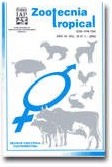
|
Zootecnia Tropical
Instituto Nacional de Investigaciones Agrícolas Venezuela
ISSN: 0798-7269
Vol. 27, No. 1, 2009, pp. 97-103
|
 Bioline Code: zt09012
Bioline Code: zt09012
Full paper language: Portuguese
Document type: Research Article
Document available free of charge
|
|
|
Zootecnia Tropical, Vol. 27, No. 1, 2009, pp. 97-103
| en |
Pollinators biodiversity and floral biology on eggplant crop ( Solanum melongena  ) )
Montemor, Kleber A. & Malerbo Souza, Darclet T.
Abstract
The present experiment was carried out at Ribeirão Preto, SP, Brazil, in 2006 and 2007 with the objective to
identify the pollinators and the behavior (frequency, constancy, nectar, and pollen collection) of insects on flowers
of eggplant crop ( Solanum melongena

L.). For this, there were recorded the frequency of the insects (counted
during ten min, every hour) from 7:00 to 18:00 h with three replications (different days). The eggplant flowers
did not show a specific time to open. Exomalopsis

sp., Pseudaugochloropsis gramínea

, Bombus atratus

, Oxaea flavescens

, and Trigona spinipes

were the visitors on egg plant flowers in 2006 (29.9, 23.9, 20.9, 19.1, and
6.2%, respectively) and B. atratus, P. gramínea, Exomalopsis sp. e O. flavescens (38.6, 25.9, 21.3, and 14.2%,
respectively) in 2007. The evaluated bees collected only pollen from flowers and only T. spinipes did not present
a vibrate forage behavior. Exomalopsis sp., P. gramínea, and B. atratus were considered important pollinators of
this vegetable species. The presence of these bees increased eggplant production.
forage behaviour, pollinators, pollination, eggplant, Solanum melongena
|
| |
| pt |
Biodiversidade de polinizadores e biologia floral em cultura de berinjela ( Solanum melongena  ) )
Montemor, Kleber A. & Malerbo Souza, Darclet T.
Resumo
Este experimento foi conduzido em Ribeirão Preto, SP, Brasil, em 2006 e 2007 e teve como objetivo identificar
os agentes polinizadores e o comportamento (freqüência, constância, coleta de néctar e de pólen) desses insetos
nas flores da cultura da berinjela ( Solanum melongena

L.). Para isso, observou-se a freqüência dos insetos, nos
primeiros 10 minutos em cada horário, das 7:00 às 18:00 h, com três repetições (dias distintos). Observou-se que
não há um horário definido para a abertura das flores da berinjela. Os insetos visitantes das flores, em 2006, foram
Exomalopsis

sp. (29,9%), Pseudaugochloropsis gramínea

(23,9%), Bombus atratus

(20,9%), Oxaea flavescens

(19,1%) e Trigona spinipes

(6,2%). Em 2007, foram B. atratus (38,6%), P. gramínea (25,9%), Exomalopsis sp.
(21,3%) e O. flavescens (14,2%). Todos esses insetos coletaram apenas pólen das flores e apenas T. spinipes não
apresentou comportamento vibratório. Exomalopsis sp., P. gramínea e B. atratus foram consideradas importantes
polinizadores dessa espécie vegetal. A presença dessas abelhas aumentou a produção de berinjelas.
comportamento de forrageamento, agentes polinizadores, polinização, berinjela, Solanum melongena
|
| |
© Copyright 2009 - Zootecnia Tropical
Alternative site location: http://www.sian.inia.gob.ve/repositorio/revistas_ci/ZootecniaTropical/ztindice.htm
|
|
